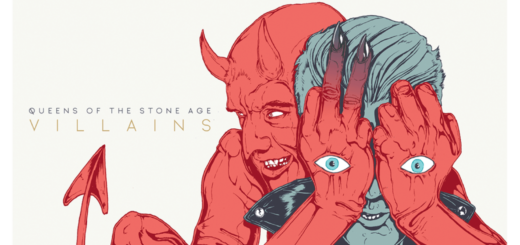Music Roundup 5/15/18
We’re here to tell you what’s hot and what’s not in this week’s music roundup
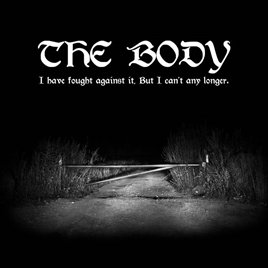
The Body – I HAVE FOUGHT AGAINST IT, BUT I CAN’T ANY LONGER.
Genre: Death Industrial, Drone Metal
Favorite Tracks: “Can Carry No Weight,” “The West Has Failed,” “Nothing Stirs,” “An Urn”
One of the most prolific metal acts of the last five years continues to push boundaries and subvert expectations on their 14th full-length. Having been huge fans of ASCENDING A MOUNTAIN OF HEAVY LIGHT, their excellent 2017 collaboration with Full of Hell, we were certainly curious as to what would come next, as you should never assume The Body are going to give you exactly what you expect. Though not entirely without precedent, perhaps most close to 2016’s polarizing, “pop”-influenced NO ONE DESERVES HAPPINESS, I HAVE FOUGHT AGAINST, BUT I CAN’T ANY LONGER. is challenging but ultimately delivers, further proof of an uncompromising and totally unique vision.
Might as well get it out of the way from the top: Chip King’s vocals continue to be an entirely subjective taste, and anyone who has found them unappealing in the past will certainly not find them more palatable when paired against a more reserved, beat-oriented industrial backing as opposed to punishing guitar work. The forgiving industry terminology seems to rest its laurels on “slaughterhouse squeal.” To be frank, it often sounds like one of those rubber chickens being strangled to within an inch of its life. But what it may lack in traditional aesthetic merits it makes up for in augmentation of atmosphere, and the sense of despair as presented on the album is an all-encompassing one. However, it’s a less oppressive breed than on past efforts; in fact, in many ways, this is the first album from The Body that legitimately flirts with a sense of beauty. Whether it be the incorporation of ethereal female vocalists to offset King’s screeching, a pensive and slowly developing melodic front that culminates in orchestral explosions (“Nothing Stirs”), or just the overarching sense that actual songcraft instead of malicious soundscape construction is occurring, the juxtaposition on I HAVE FOUGHT AGAINST IT . . . does double duty, making the album both their most and least accessible effort. To be fair, it still absolutely rips every once in awhile (album highlight “An Urn,” “Sickly Heart of Sand”) and is still a metal-adjacent release, but it’s certainly unlike anything else coming from the scene right now. If you like this sort of thing, this will be the sort of thing you’ll like. [Thomas Seraydarian]
Verdict: Recommend
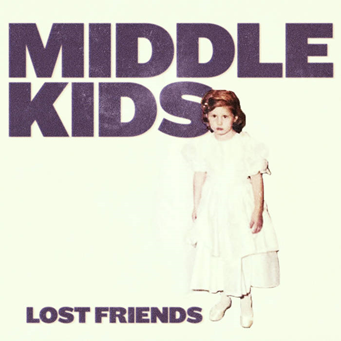
Middle Kids – LOST FRIENDS
Genre: Indie Rock
Favorite Tracks: “Don’t Be Hiding,” “So Long, Farewell, I’m Gone”
“So let it out / I need a little something and I can’t seem to get it / Now, love, help me now/ I got a lot of questions and I can’t seem to get them out.” If you can get through the chorus of “Bought It,” the opener to this Australian trio’s debut full-length and not get a little nauseous, than maybe LOST FRIENDS is for you, because every subsequent song repeats the same musical, lyrical, and emotional arc. They all start with gloomy jangles of guitars with fragments of more discordant tones that explode in the bridge, and all of the choruses are framed as anthemic singalongs; I heard Wye Oak handle the blend of clean and dissonant sounds to create an uneasiness and eventual catharsis a lot better earlier this year.
The only way to salvage this would be to have a frontwoman with unbelievable charisma or enough interesting, quirky lyrics to make the quarter-life crisis not seem superfluous. There are moments where Hannah Joy has a sticky vocal melody or a decent lyric or two, but it’s almost always followed by a clunker that throws off any poignancy. “Don’t Be Hiding” is a self-reflective look at accepting the flaws of one’s partner, and yet it’s almost ruined by the bizarre reasoning that she does it “for no other reason that it makes it more exciting.” “Please” is one of the most musically enjoyable tracks, as the layers of distorted guitars and the violin-dominated outro are a welcome change of pace. However, the story about a loved one’s sudden passing and the subsequent bargaining for more time aren’t as impactful as they should be, because there’s no insight into why the singer has such a connection with the deceased. There are hints of a more complete, complex sonic palette, like the outro of “So Long, Farewell, I’m Gone,” but there would need to be massive lyrical improvements for me to get into future release. Those who have an endless appetite for indie rock and an even more endless tolerance of its cliches might find something of value here, but there’s no shortages of bands doing much more with the same sound and emotions that Middle Kids work with. [Blake Michelle]
Verdict: Do Not Recommend

Simian Mobile Disco – MURMATIONS
Genre: Tech House
Favorite Tracks: “A Perfect Swarm”
Over the past 15 years, Simian Mobile Disco has been among the consistent, albeit unsung, groups in electronic music. The English duo started as an offshoot from Simian, a rock band most notable for being the source material to Justice’s “We Are Your Friends,” a remix of Simian’s “Never Be Alone.” As Simian Mobile Disco, James Ford and Jas Shaw have released a wide range of material, mostly techno, and Ford has produced records for Arctic Monkeys, Depeche Mode, and Florence and the Machine. Their latest record, MURMATIONS, is a bold step into uncharted territory that never manages to find its footing.
The record is a collaboration with The Deep Throat Choir, an all-female singing collective. The choir is the focal point for most the tracks, as Ford and Shaw scale back their production to give the choir ample space in the mix. The synths on the record are much simpler and tamer than that of their previous record, WELCOME TO SIDEWAYS, which featured wall-to-wall techno by way of the duo’s signature analog synth work. MURMATIONS opens with “Boids,” a clear sonic departure entirely devoid of percussion. The album moves into a more dance-driven direction, but nearly every song stalls about halfway through. On “Caught in a Wave (featuring The Deep Throat Choir),” Ford and Shaw begin to develop a nice groove, but it never catches momentum as the instrumental repeatedly takes a step back in favor of the choir. This is true of “Hey Sister (featuring The Deep Throat Choir)” as well. The hypnotic, nocturnal instrumental starts to build for the first 20 seconds until the choir joins in, at which point the beat becomes a loop of itself for the remainder of the song. And it’s not that the choir delivers a poor performance. Their vocals are delivered well and are quite catchy at times, but it’s frustrating to hear the beats stagnate on almost every track. “A Perfect Swarm” manages to find a perfect middle ground between the two groups as the choir offers haunting backing harmonies behind a glitchy analog soundscape. It’s the best song on the album and a teasing glimpse into what could’ve been one of Simian Mobile Disco’s best albums. [Ryan Moloney]
Verdict: Do Not Recommend
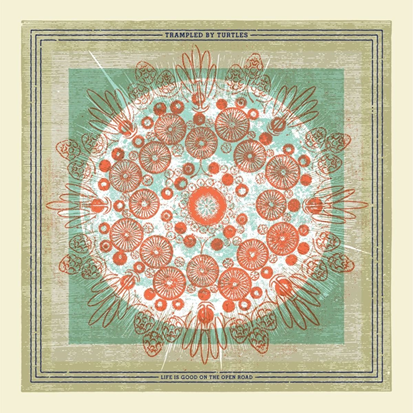
Trampled By Turtles – LIFE IS GOOD ON THE OPEN ROAD
Genre: Americana
Favorite Tracks: “Kelly’s Bar,” “The Middle,” “Blood in the Water”
It doesn’t happen often, but Trampled By Turtles are at their best when they’re fast, furious, and letting those strings whip wildly by while lead singer Dave Simonett’s vocals work furiously to keep everything together (see: “Western World,” “Walt Whitman,” “Nobody Else,” or the group at the peak of their powers with “Wait so Long” and “It’s a War” off of 2011’s PALOMINO). One of the things that makes LIFE IS GOOD ON THE OPEN ROAD such an immediate delight is the rush that comes with opener “Kelly’s Bar,” a speedy and reflective recounting of a drunken evening in Red Wing, Minnesota. That swift plucking of mandolin and mad dash of banjo is far more frequent on the bluegrass group’s eighth studio album than it has been on their past several releases, and life for Trampled By Turtles truly does seem to be good. The sheer chaos of the group’s playing comes in fully on the blink-and-you’ll-miss-it “Blood in the Water,” and that splitting-at-the-seams playing can be heard on the breakdowns of “Annihilate” and “The Middle.” In fact, most of the first two-thirds of LIFE IS GOOD ON THE OPEN ROAD is uptempo and celebratory—even “We All Get Lonely” seems accepting and embracing of the depressions that come and go in our lives, concluding positively that, “We all get lonely / Yeah then we make it through.” While this latest outing is certainly the group’s most playful album in a number of years, it’s nothing revolutionary, nor should it be. These six pieces have clicked together the same way for a decade-and-a-half, and if you appreciate the band’s brand of bluegrass and folk, this is a must listen. LIFE IS GOOD ON THE OPEN ROAD is as good a record as they’ve had since their fame turn with PALOMINO, and it represents just as good an introduction to their pickalong world as any album that’s come before it. [CJ Simonson]
Verdict: Recommend
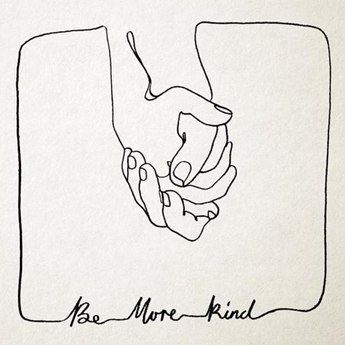
Frank Turner – BE MORE KIND
Genre: Singer/Songwriter, Folk Rock
Favorite Songs: “Don’t Worry,” “Be More Kind,” “Going Nowhere,” “Blackout,” “Lifeboat”
You can take the man out of punk, but you can’t take the punk out of the man. Frank Turner is back to remind us to make the world a better place, but with a little more political grit than he’s dared before as a solo artist. In BE MORE KIND, Turner contrasts tumultuous current events with his lightest music ever, walking a fine line between sounding like a British Mat Kearney and a folk punk troubadour. “1933” and, to a lesser extent, “Brave Face,” channel his punk roots. The former showcases his rawest vocals, as Turner sings his frustration with the rise of nationalism and fascism in today’s political landscape and compares it to the rise of the Nazi Regime 85 years ago, whereas the latter is a heart-warming call-to-action anthem which wouldn’t be as pleasant were it not for his days as a member of Million Dead.
Turner and his band, The Sleeping Souls, have steered closer towards pop in “Little Changes” which, like the title track, misses its mark on its own, coming off slightly naive and idealistic—a common difficulty in writing music of this nature. The softness of the music doesn’t match the emotions or issues being tackled; however, as a part of the thesis of BE MORE KIND, it serves as a reminder that even in the darkest times we have to make room for kindness, even when it’s the last possible thing on our mind. Some might claim Turner is selling out by adopting a more mainstream genre, but I think an argument can be made that it’s actually the work of a mastermind.
“Going Nowhere” echoes a song from his previous album, “The Ballad Of Me & My Friends” from LAST MINUTES AND LOST EVENINGS, in which he approached the idea of going nowhere. This time round Turner talks of when, “you worked a 62-hour week but you ended up broke . . . ‘Cause you were counting on your countrymen and women not to go berserk.” Stylistically the music leans more on a blues axis than a folk rock one, with a very simple melody and little-to-no drums to back it. More interesting, though, Turner sneaks in a love ballad, “There She Is,” that seems out of place contextually because when you’re exploring the shortcomings of the 21st century, the last thing you expect is a beautifully composed love story with horns and xylophones.
BE MORE KIND is a robust collection that is worth more as a whole than its individual parts. Despite not being particularly convinced by this Frank Turner-lite, his seventh solo album is well-crafted and worthy listen because of the catchy melodies and inspiring messages he has woven into his commentary: “Let’s make America Great Again by making racists ashamed again”. [Liliane Neubecker]
Verdict: Recommend

